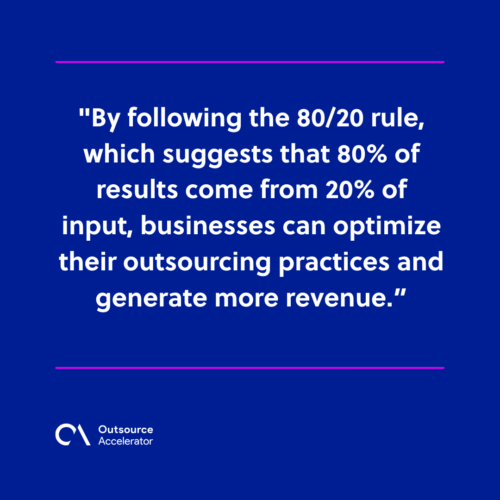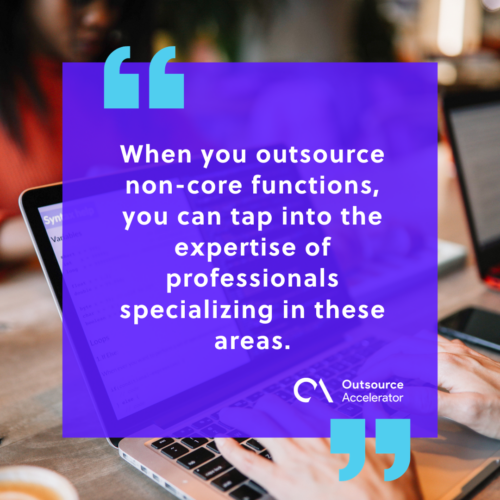Boosting Australian business profits with the 80/20 rule in outsourcing

This article is a submission by Sudo Staff Pty Ltd. Sudo Staff Pty Ltd is an Australian employee outsourcing company providing overseas support staff to businesses across Australia.
In the competitive landscape of the Australian business sector, every organization strives to maximize its profits and minimize costs.
One powerful strategy that can help businesses achieve this goal is the application of the Pareto Principle, also known as the 80/20 rule. This principle suggests that 80% of your results come from 20% of your efforts.
This article explores how Australian businesses can leverage the Pareto Principle in outsourcing, focusing on what truly matters – generating more revenue.
Understanding the 80/20 rule
The Pareto Principle, initially coined by the brilliant Italian economist Vilfredo Pareto, has revolutionized how businesses operate. This powerful concept highlights that approximately 80% of outcomes are driven by just 20% of cases in most scenarios.
In the business world, it is often observed that 80% of profits stem from just 20% of:
- Products
- Customers
- Efforts
Therefore, identifying and maximizing that critical 20% can be the key to unlocking unparalleled success. Firms must harness the Pareto Principle to optimize their business strategy and achieve extraordinary results!
Outsourcing and the 80/20 rule
Outsourcing can be a powerful tool for Australian businesses seeking to enhance their profitability.
It enables companies to delegate non-core tasks, such as payroll, customer service, or IT support, to third-party service providers.
Outsourcing allows them to concentrate on what they do best. This means businesses can devote more time and resources to their core competencies, such as product development, marketing, or sales.

By following the 80/20 rule, which suggests that 80% of results come from 20% of input, businesses can optimize their outsourcing practices and generate more revenue.
With outsourcing, Australian companies can streamline operations, reduce costs, and improve efficiency.
1. Identifying the vital 20%
To implement the Pareto Principle rule correctly when outsourcing, it is essential to start by identifying your organization’s most critical tasks and processes.
It would be best to analyze which functions contribute the most to your business’s bottom line and which are time-consuming, with little or no direct revenue generation. Pinpointing these areas accurately lets you allocate your resources more efficiently.
For instance, you are running an e-commerce business in Australia. You may use sales data analysis to identify which products generate the most revenue and which don’t.
You can then focus your outsourcing efforts on optimizing the production and marketing of these high-performing items while minimizing investment in less profitable products.
It’s essential to note that outsourcing is not always the best solution to every problem. It would be best to weigh the costs and benefits of outsourcing individual functions against keeping them in-house.
Additionally, selecting the right vendor, communicating your requirements clearly, and continually monitoring its performance are crucial.
You can ensure successful outsourcing and optimize the efficiency of your organization by carefully considering these factors.
2. Outsourcing non-core functions
One of the critical steps in optimizing business operations is to identify the crucial 20% and focus on them.
Once these areas have been determined, it becomes essential to consider outsourcing non-core functions.
This is particularly relevant for Australian businesses, which can use specialized service providers to delegate tasks such as:
- Customer support
- Data entry
- IT support
- Payroll processing
Outsourcing these non-core functions can provide significant benefits to businesses. For instance, it can help reduce operational overhead and costs while freeing up valuable time and resources for revenue-generating activities.
Additionally, outsourcing can help companies access specialized expertise and technology that may not be available in-house. It can result in improved efficiency, productivity, and overall performance.
Outsourcing non-core functions is a smart strategy for businesses looking to optimize their operations and focus on their core competencies.
By doing so, they can achieve greater efficiency, cost savings, and, ultimately, more tremendous success.
3. Leveraging specialist expertise
Outsourcing has become widespread among Australian businesses because it offers numerous benefits.
When you outsource non-core functions, you can tap into the expertise of professionals specializing in these areas.
These specialists can provide you with a higher quality of work, as they are focused on delivering the best possible outcomes.

Additionally, outsourcing can increase efficiency by freeing your team’s time and resources to focus on core business functions. This, in turn, can lead to improved product or service offerings, which is vital for revenue growth.
Outsourcing also allows you to access the latest technologies and practices, which can help you stay competitive in your industry. It is an innovative and effective way for businesses to achieve their goals and improve their bottom line.
4. Cost optimization
To optimize your company’s cost structure, one efficient approach is to delegate functions that are not critical to your core business operations.
Australian businesses can reduce the expenses of maintaining in-house departments and facilities, resulting in significant cost savings. This approach frees up resources that can be invested in income-generating areas, like:
- Product development
- Marketing
- Customer service
By outsourcing non-core functions, businesses can benefit from the expertise and efficiency of specialized service providers who can perform these tasks more efficiently and cost-effectively.
This can include functions such as human resources, payroll, accounting, IT support, and customer service.
Moreover, outsourcing non-core functions can also help businesses improve their focus on core business activities, allowing them to concentrate on their strengths and core competencies.
This focus can lead to better quality products and services, increased customer satisfaction, and greater profitability.
Overall, outsourcing non-core functions offers a strategic and cost-effective way for Australian businesses to optimize their cost structure while improving their focus on core business activities and driving growth and success.
Real-life examples of 80/20 rule in outsourcing
Let’s take a closer look at how some Australian businesses have successfully implemented the 80/20 rule in outsourcing to boost their profitability:
E-commerce giants
Many Australian e-commerce companies have outsourced warehousing and logistics to reliable third-party providers. This allows them to concentrate on sales, marketing, and product development, which are the core drivers of their revenue.
Technology startups
Tech startups in Australia often outsource app and software development to offshore development teams. It helps them speed up their product development process while staying cost-effective.
Service-based businesses
Australian law firms, accounting firms, and marketing agencies also outsource administrative tasks like data entry, appointment scheduling, and bookkeeping.
This enables their professional staff to focus on delivering high-value services to clients.

Incorporate the 80/20 rule in outsourcing effectively
The Pareto Principle, also known as the 80/20 rule, can be a valuable tool for Australian businesses that want to maximize their profits and remain competitive in today’s dynamic business environment.
By identifying 20% of their critical operations and outsourcing non-core functions, companies can reduce costs, optimize processes, and allocate resources more efficiently, increasing revenue.
To succeed, businesses must comprehensively understand their core competencies and how to leverage outsourcing to augment those strengths.
Implementing the 80/20 rule to the outsourcing strategy can help Australian companies take significant strides towards achieving greater profitability and long-term success.







 Independent
Independent




